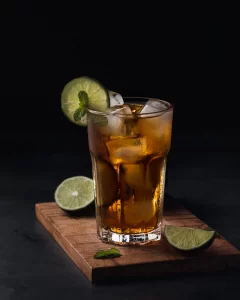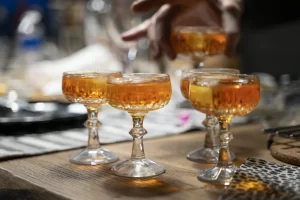Minnesota Liquor Laws And Regulations
Are you interested in starting a distillery in Minnesota? With the right knowledge and understanding of Minnesota’s liquor laws and regulations, you can be on your way to starting an exciting business venture.
This article will provide you with an overview of the necessary steps involved in setting up and operating a distillery in the state of Minnesota; we will cover topics such as obtaining a license, safety guidelines, taxes, and more.
We’ll also discuss the various types of distilleries that are allowed in Minnesota and the processes that must be followed to produce spirits legally, as well as some top tips on how to succeed in this business venture.
What Is A Distillery?
A distillery is an industrial facility that manufactures alcoholic beverages such as beer, wine, and spirits. Distilleries also produce essential oils and other specialty products.
The process of distilling involves the fermentation of a mash or wort and then separating the alcohol from the water through evaporation. This process can take several weeks to complete, depending on the type of spirit being produced.
How Do I Open A Distillery In Minnesota?
To open a distillery in Minnesota, the first step is to obtain a liquor license from the state. Once you’ve obtained the necessary licenses, you must follow safety guidelines and pay taxes on any alcohol that is sold with an intoxicating liquor license.
Additionally, it’s important to familiarize yourself with the different types of distilleries allowed in Minnesota, as well as the processes that must be followed to produce spirits legally.
Finally, it’s always a good idea to create a business plan and obtain the appropriate funding before opening your distillery – this will allow you to get off to a strong start and ensure your success.
Distilling Process
Once you have obtained the necessary licenses and permits, you can begin distilling your spirits. This process involves a combination of fermentation, distillation, and aging to create a finished product.
During the fermentation process, yeast is added to a mixture of grain or other sources of sugar to produce alcohol. The alcohol is then distilled to increase its concentration and flavor. Finally, the spirits are aged in barrels to further enhance their flavor.
Do I Need A License To Brew Alcohol In Minnesota?
No, you do not need a license to brew alcohol in Minnesota if you are only planning to distill and brew for family use. However, if you plan to sell your product and/or distribute it to retail outlets, then you will need to obtain a liquor license from the State of Minnesota.
In addition to obtaining the necessary licenses and permits, certain safety guidelines must be followed when operating a distillery in Minnesota.
Obtaining A License
The first step to starting a distillery in Minnesota is obtaining a liquor license. In the state, there are two types of licenses available for distilleries: On-Sale and Off-Sale.
An On-Sale license allows you to sell your products directly from the premises; an Off-Sale license permits you to sell only at off-site locations. In addition to the license, you must also obtain a Federal Basic Permit from the Alcohol and Tobacco Tax and Trade Bureau (TTB).
Safety Guidelines
In order to ensure the safety of your employees, customers, and the public, there are specific guidelines that must be followed when operating a distillery in Minnesota.
These include: maintaining safe working conditions; adhering to local fire codes; keeping flammable liquids away from heat sources; and ensuring proper ventilation. Additionally, all employees must receive training on the proper handling of alcoholic beverages.
Taxes
In addition to obtaining the necessary licenses, distilleries in Minnesota must also pay taxes on the sale of their products.
Any beer, wine, or liquor that is sold with an intoxicating liquor license will be subject to 6.875% State general rate sales tax, and 2.5% liquor gross receipts tax, as well as any local taxes that apply.
Types of Distilleries

In Minnesota, there are a variety of different types of distilleries that can be operated. These include:
Craft Distilleries
Craft distilleries are those which produce spirits in small batches using traditional methods. These are typically family-run operations that focus on producing high-quality, artisanal products.
Industrial Distilleries
Industrial distilleries are large-scale operations that produce spirits in bulk quantities for commercial sale. They often use industrial equipment and processes to create their products.
Contract Distilleries
Contract distilleries are businesses that contract with other companies to produce spirits on their behalf. The contracted company may be responsible for the entire production process, from fermentation to aging and bottling. This type of distillery is often used by larger companies that do not have the capacity or resources to produce their own spirits.
Who Can Sell Liquor In Minnesota?
In Minnesota, only businesses with valid liquor licenses are allowed to distribute and sell alcoholic beverages. In order to obtain a license, the business must be licensed by the State of Minnesota Department of Public Safety (DPS).
This includes both on-premise (bars and restaurants) and off-premise (liquor stores) licenses. Businesses must also comply with all applicable laws and regulations, including those pertaining to the sale of alcohol to minors.
Liquor Laws Minnesota
In Minnesota, there are a number of liquor laws that must be followed in order to legally sell, serve and distribute alcoholic beverages. These include:
Minors under the age of 21 are prohibited from purchasing, possessing, or consuming alcohol.
It is illegal to consume alcohol on public property or in public places such as parks or sidewalks.
All alcoholic beverages must be purchased from a licensed retailer or wholesaler.
Businesses must obtain a valid liquor license and comply with all relevant laws and regulations.
It is illegal to drive while under the influence of alcohol.
Final Thoughts
Starting a distillery in Minnesota can be a complex process, but with the proper licenses, taxes, and safety guidelines in place, it is possible to successfully operate a successful business.
It is important to familiarize yourself with all relevant laws and regulations before beginning the process, as well as to understand your target audience and the kind of product you plan to produce.
With these elements in place, you can be sure that your distillery is compliant and successful, and ensure that you are working according to all Minnesota laws and processes.









